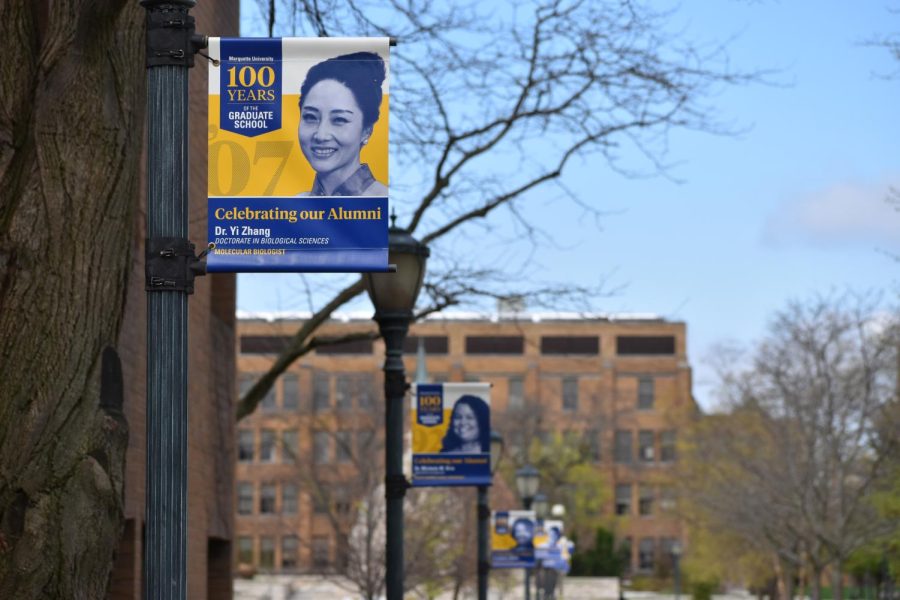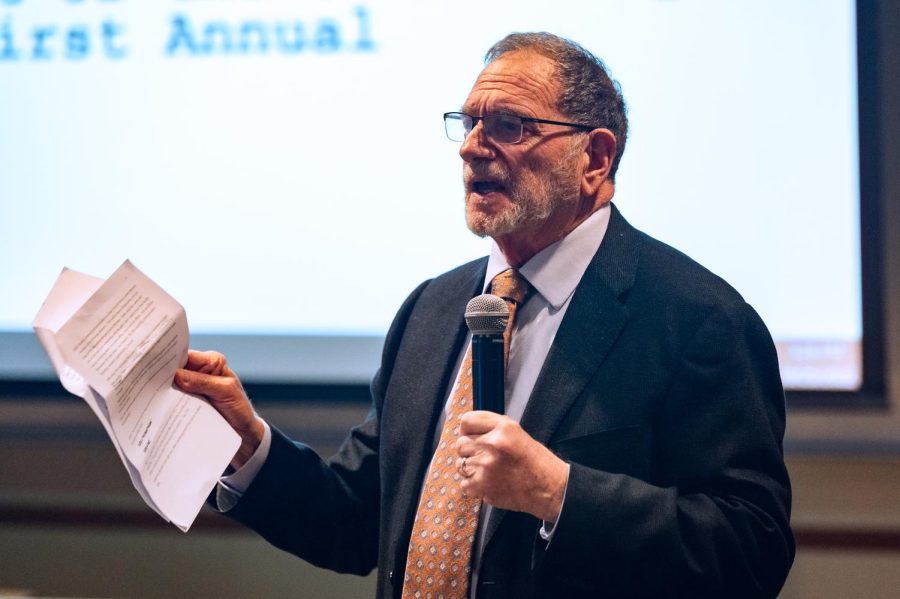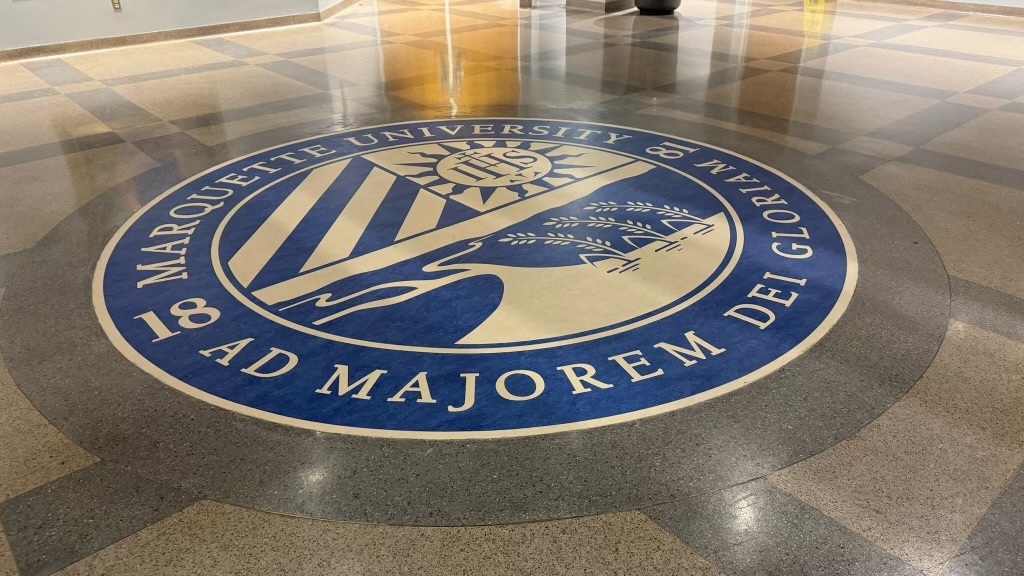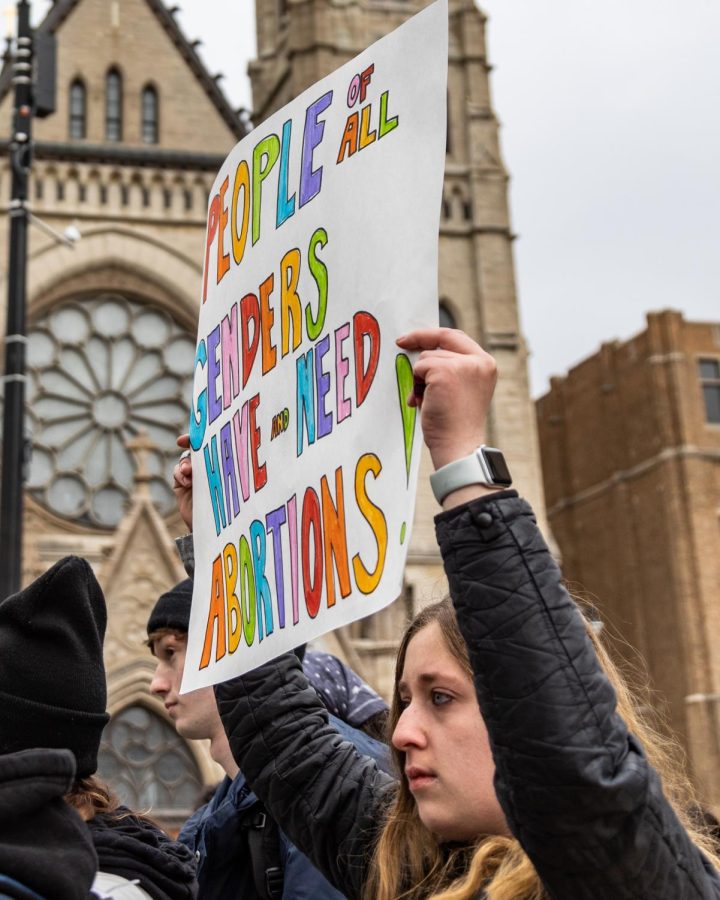Jannea Thomason, a graduate student in the College of Arts & Sciences, used to sit in her class lectures, taking notes next to her then-seven-year-old son whose eyes were fixated on his latest library book.
Thomason is an English major at Marquette planning to become an English professor after graduating with a Ph.D. this spring.
Once Thomason came to graduate school, her husband had to switch from being a part-time to a full-time essential worker at a hardware store so the family would have health insurance, a benefit that is not offered as a graduate student at Marquette University.
With her husband working double the hours he used to, Thomason said she was left with the responsibility of being a full-time student with a full-time job and doing 75% of the housework.
With no affordable daycare options and no child support, Thomason had no choice but to bring her son to classes.
Douglas Woods, dean of the Graduate School, said the minimum stipend for the graduate school is $17,440 for a nine-month period. However, stipend rates differ among universities for the positions of teacher assistant, resident assistant and graduate assistant. Stipends for these roles can vary depending on the university, Woods said. Marquette falls higher for some and lower for others.
“It is important to keep in mind that assistantships are appointments students get not only to help offset the costs of their education but also provide them with valuable learning opportunities that will help further their education and career,” Woods said in an email.
Woods also mentioned that all stipends include full tuition in exchange for 20 hours of work per week for students who work part-time. Full-time students are also given $375 per semester to help with other costs relating to rent or healthcare.
Ben Pladek, an associate professor and director of graduate studies in English, said he thinks graduate students are not paid a livable wage.
A survey that depicts the minimum living wage in Milwaukee shows that stipends for Ph.D. students at Marquette are $10,000 below the minimum living wage in Milwaukee which is about $33,700.
“This is shamefully inadequate. Marquette must do better,” Pladek said in an email.
Maddy Henry, a graduate student in the College of Communication, said the program has been both amazing and chaotic. Henry is a TA teaching media and society. Henry’s dream job is to become an editor at a publishing company.
“(Graduate school) has definitely been full of ups and downs. My group of teaching assistants came at a time of change. They were rewriting the curriculum, but there’s been a good amount of support, so I’ve really enjoyed it. I’ve learned a lot the past two years, and it stretches you to your limits. I found the challenge pretty fun,” Henry said.
Although Henry enjoyed the classroom setting, she said the wage was not one she could live off of once factoring in insurance, rent and food. Henry is currently on her dad’s family health insurance, which is only an option for some students.
However, insurance benefits aren’t the only thing graduate students worry about. Pladek said the stipend rates are also poor.
A survey by the Modern Language Association in 2022 shows that Marquette’s Ph.D. stipends are among the lowest, even when stipends are adjusted for cost of living.
Woods said that of the universities in the survey, only around 50% submitted their results, leaving him to wonder what the response rate would be if all of the results were submitted.
“Unfortunately, as with everywhere in higher education, we have to work within our budgetary constraints to do the best we can. Ultimately, I am willing to work with departments to determine how we can best utilize the funds we do have to both meet the university mission around graduate education and research, while also being as competitive as possible to attract and support our graduate students,” Woods said in an email.
Sarah Kizuk, a graduate worker in the philosophy department, said that not only are graduate students paid just above the poverty line, but some of them also work beyond their contracted hours. On top of that, Kizuk said that the stipends are taxed and do not follow inflation.
“I can’t speak for everybody, but I don’t know any graduate worker that works only the hours for their contracts. If you want to offer the quality education that Marquette claims to offer, there’s no way to only work for 20 hours which means you’re taking away from your research duties. There’s conflict between the demands of our jobs which we all care about and our own work,” Kizuk said.
This means that instead of hiring full time faculty which consists of increased pay and benefits, the TAs and graduate students are taking on roles that are fundamental for the university without the benefits, Kizuk said. Although Kizuk had proper training when becoming a TA, she said not all graduate workers have that benefit and some are just thrown into teaching classes.
Kizuk also meets with both graduate and undergraduate students on campus towards the effort of unionizing. She said that despite requesting to meet with administration to discuss unionization, it never took place.
Kizuk helped plan a protest outside of Zilber Hall in March of 2021. The protest started on the sidewalk with a speaker commenting on conditions of labor at Marquette before they began their march blocking off 12th and Wisconsin.
They held the blockade for over an hour giving speeches about working conditions for contingent faculty, staff in favor of unionization and demands for racial justice on campus.
“The things that I love the most at Marquette have been trying to unionize graduate workers, that’s been most rewarding,” Kizuk said. “It goes hand in hand with the most challenging memories. Talking to grad students and hearing the ways they struggle and what they have to do to make ends meet, it’s devastating and infuriating.”
Kizuk has a job as a professor set for next fall after she graduates.
While Henry, Thomason and Kizuk all have different career goals, all sources have one thing in common: They all agree the process of getting their degrees has been a big challenge. However, they also agree fellow staff and students have contributed to a positive experience.
Thomason said although circumstances were tough at times, the support systems she had in place were phenomenal.
The English department currently offers a food pantry for their students, especially for those struggling to have enough money for groceries.
“The staff at Marquette are amazing, they understand the position we’re all in as graduate students and do everything they can,” Thomason said. “If I had to recommend Marquette it would be because of the teachers and the people.”
This story was written by Jolan Kruse. She can be reached at [email protected]










